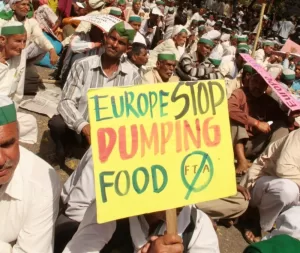Jessica Corbett
The United Nations labor agency warned Wednesday that “1.6 billion workers in the informal economy—that is nearly half of the global workforce—stand in immediate danger of having their livelihoods destroyed” by the worldwide economic crisis created by the coronavirus pandemic.
Lockdowns recommended by public health officials to stop the pandemic have meant business closures that have led to lost jobs and incomes. Global working hours fell 4.5%, the equivalent of 130 million full-time jobs, in the first quarter of 2020 compared with pre-crisis levels, according to the International Labor Organization (ILO).
The ILO’s report (pdf) warns the world could see that decline hit 10.5% by mid-year, the equivalent of 305 million full-time jobs. The new numbers follow an early April report from agency detailing how lockdowns across the globe were already affecting almost 2.7 billion workers, around 81% of the world’s workforce of 3.3 billion.
While the economic fallout of the crisis is expected to continue impacting the majority of global workers, that is especially true for those in the informal economy, which generally refers to workers whose employment conditions are “not recognized, registered, regulated, or protected under labor legislation and social protection.”
As the new ILO report explains:
More than two billion people worldwide work in the informal economy in jobs that are characterized by a lack of basic protection, including social protection coverage. They often have poor access to healthcare services and have no income replacement in case of sickness or lockdown. Many of them have no possibility to work remotely from home. Staying home means losing their jobs, and without wages, they cannot eat.
As of 22 April 2020, close to 1.1 billion informal economy workers live and work in countries in full lockdown, and an additional 304 million in countries in partial lockdown
The agency estimates “almost 1.6 billion informal economy workers, accounting for 76% of informal employment worldwide, are significantly impacted by the lockdown measures and/or working in the hardest-hit sectors.” The ILO projects income losses for these workers will be “massive” and further increase income inequality.
The sectors hardest hit by current global conditions are wholesale retail, trade and the repair of motor vehicles and motorcycles; manufacturing; accommodation and food services; and real estate, business, and administrative activities. Other significantly affected sectors include arts, entertainment, and recreation as well as transport, storage, and communication.
“Among informal economy workers significantly impacted by the crisis,” the report notes, “women are overrepresented in high-risk sectors: 42% of women workers are working in those sectors, compared to 32% of men.”
Given the new projections about how the pandemic-related economic crisis will affect workers worldwide, the ILO urges governments to pursue “urgent and significant policy responses to protect both enterprises, particularly smaller businesses, and workers, especially those operating in the informal economy.”
Potential impacts of the pandemic on poverty levels of informal workers
The report reiterates the ILO’s four-pillar policy framework to fight the economic impact of Covid-19 based on international labor standards: stimulating the economy and employment; supporting enterprises, jobs, and incomes; protecting workers in the workplace; and relying on social dialogue for solutions.
The ILO calls on governments to prioritize financial support for small businesses and informal economy workers, and to coordinate stimulus packages on a global scale. The report adds that “longer-term, large public investments are needed to boost employment and crowd in private investment.”
In addition to detailing the need for longer-term financial aid, the report makes a case for the necessity of improving labor conditions as part of the recovery phase, noting that “the impact of the pandemic is likely to be uneven, adding significantly to existing vulnerabilities and inequalities.”
“Greater attention should be paid to the strengthening of employment policies to support enterprises and workers,” the report says, “along with strong labor market institutions and comprehensive and well-resourced social protection systems, including care policies and infrastructure, that kick in automatically and in an inclusive way as crises occur.”
(Courtesy: Common Dreams, a US non-profit news portal.)




